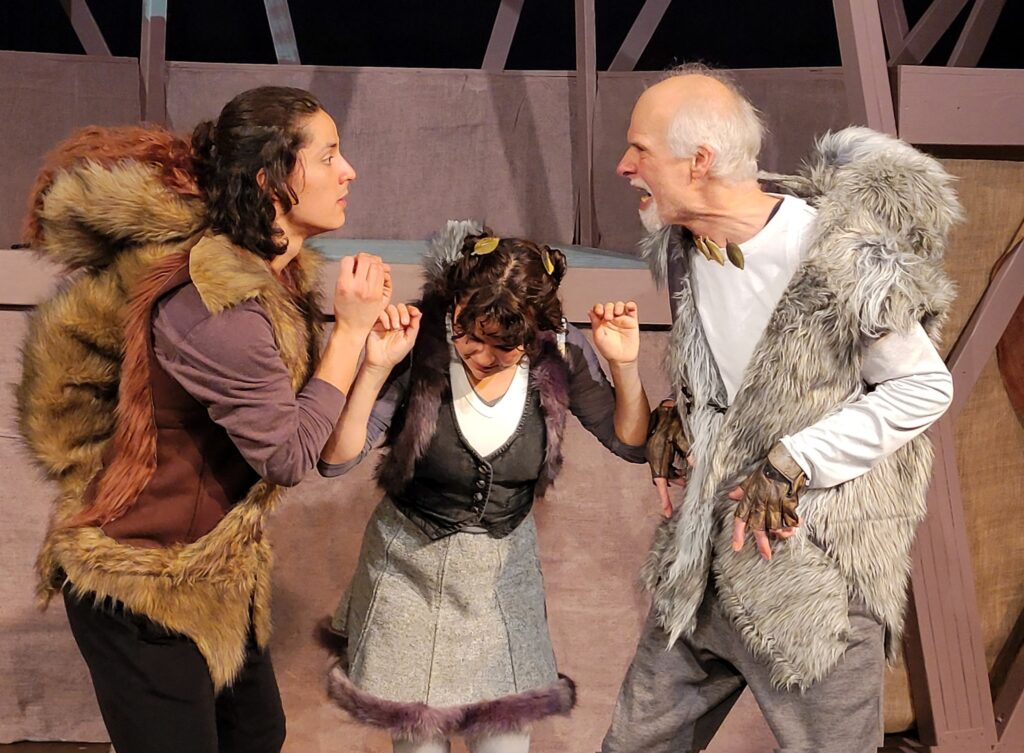
‘The Squirrels.’ Written by Robert Askins. Directed by Brooks Reeves. Movement Choreography by Audrey Johnson; Fight Choreography by Matt Dray; Scenic and Sound Design by Joseph Lark-Riley; Costume Design by Susan Paino. Presented by Apollinaire Theater Co. at Chelsea Theatre Works, 189 Winnisimmet St., Chelsea through May 18th.
By Shelley A. Sackett
Playwright Robert Askins is known for fusing razor-edged socio-political insights and wacky, ingenious extended metaphors. In the irreverent comedy, Hand to God, he uses puppetry, including a possessed Christian ministry puppet, to explore themes of faith, morality, and the ties that bind us. In The Squirrels, he taps the squirrel world as a conceit through which to expose and study our own instinctual compulsion towards tribalism and ultimate self-destruction.
Under Director Brooks Reeves’ steady hand, and with brilliant acting and near-flawless execution, Askins’ sharp, clever script provides the audience with an evening of thought-provoking theater that is also a jolly good time.
Everyone in the cast except The Scientist (Thain Bertin) is a squirrel, unmistakable by their costumes of bushy tails and paw fur and their chitters, purrs and squeaks. The Scientist, by contrast, wears a white lab coat and functions as our guide and teacher. He offers up fascinating factoids. For example, squirrels are sneaky thieves that dig up other squirrels’ nuts and bury them. In the case of gray squirrels, they will eat anything, including each other. “Buckle up, you discerning patron of the arts!” he warns, and by the play’s end, you understand why. In a town full of dozens of theaters showing dozens of plays that sometimes blend together, The Squirrels is a boundary-pushing production that stands out and stands alone.
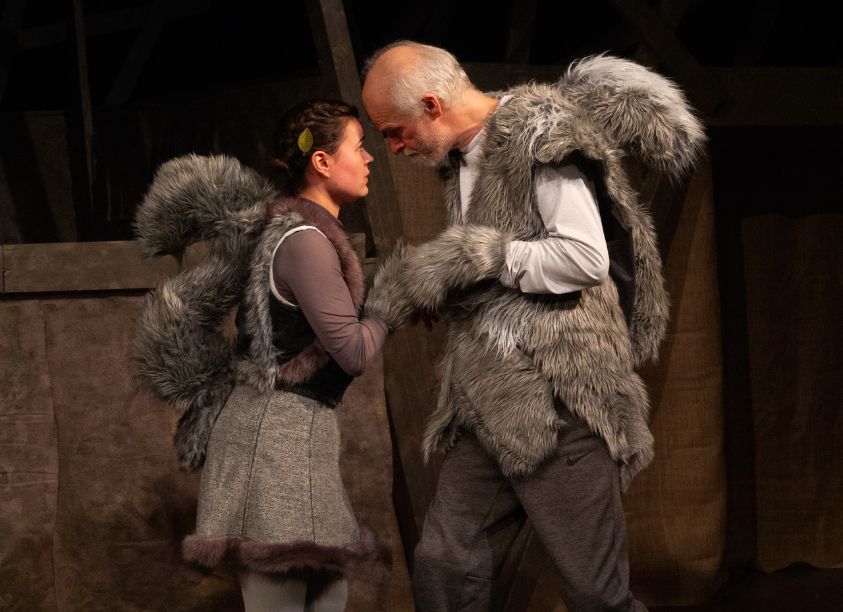
Immediately, we are brought up to speed on the current state of squirrel affairs. Sciurus (Dev Luthra) is an aging patriarch gray squirrel and staunch defender of the existing social order, which, for him, means gathering as many nuts as possible and hoarding them for his family. He is literally the top squirrel in his tree, occupying the best nut-producing branches. He couldn’t care less that the red fox squirrels, relegated to a spot near a 7-11, are starving. His mantra is “survival of the fittest” and considers the red foxes to be inferior to the grays, not deserving of equal treatment.
Sciurus is also showing signs of dementia, and, in an ironic twist of fate, while he has hidden enough nuts to feed his family for a decade, he can’t remember where they are. Mammalia (Cara Clough), his mate, humors him and supports him, but also beseeches him to share his wealth, once he remembers where it is. Their daughter, Chordata (Parker Jennings on opening night, alternating with Audrey Johnson), is in love with the red fox’s freedom fighter, Carolinensis (Mateo Bailey), and she pleads with her father to both accept this interracial coupling and soften his capitalistic, mistrustful heart. He must, she warns, do the right thing and share his food.
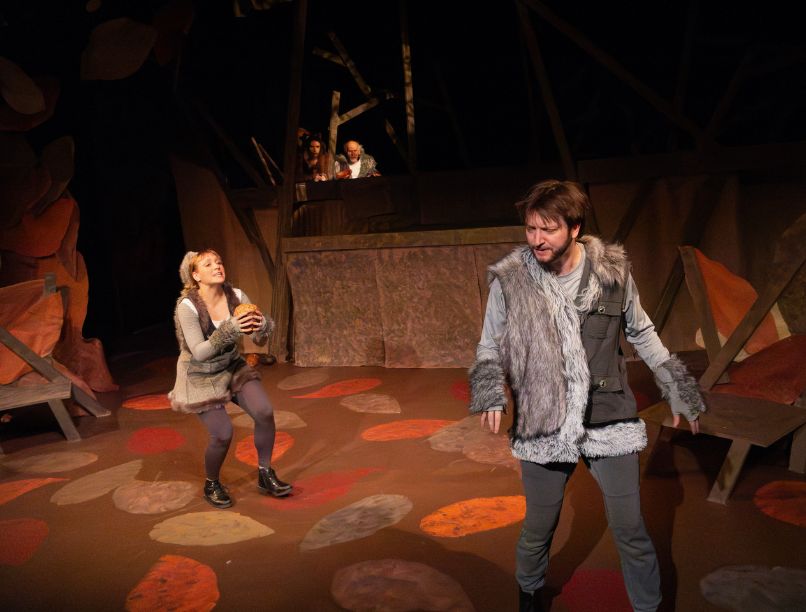
Rounding out the family is adopted daughter Rodentia (Sophia Koevary), a lustful red foxy squirrel who is as devious and unprincipled as Chordata is righteous. Into this morass of family dysfunction, nut inequality, and socio-political disruption comes the Machiavellian gray squirrel, Sciuridae (Bertin), whose one and only interest is in gaining control and power. Squirrelly Sciurus, increasingly paranoid and confused, is ripe for scurrilous Sciuridae’s picking. Gray squirrels are the master race and, biologically inferior, the reds are meant to die out, the manipulative opportunist claims. He wants to “make the tree great again” — for gray squirrels. He foments racism, squeaks hate, repeats lies, and spreads conspiracy theories until indelible lines are drawn and the grays and the reds engage in actual battle.
To give away more of the plot would give away too much, and this is a play which must be experienced. In addition to its obvious thematic timeliness are its top-notch creativity and singular production values.
Joseph Lark-Riley’s set is sparse but effective, and Reeves makes use of every square inch. It is amazing how much a small platform can suggest. Susan Paino’s costumes are ingenious, evoking a believable and endearing image of hybrid squirrel/humans, which reflects Askins’ parable perfectly. Each character’s costume differs just enough to befit their particular personality traits. Thanks to Lark-Riley’s sound design, we are IN the thick forest. Audrey Johnson’s movement choreography and the actors’ prodigious physical talents bring these squirrels to believable life without being contrived, hokey, or distracting. Twitching noses, shifty eyes, hissing, squeaking and paws that never rest create the illusion of animal instinct. Jennings, as Chordata, is particularly marvelous, with her staccato steps and bird-like head turns.
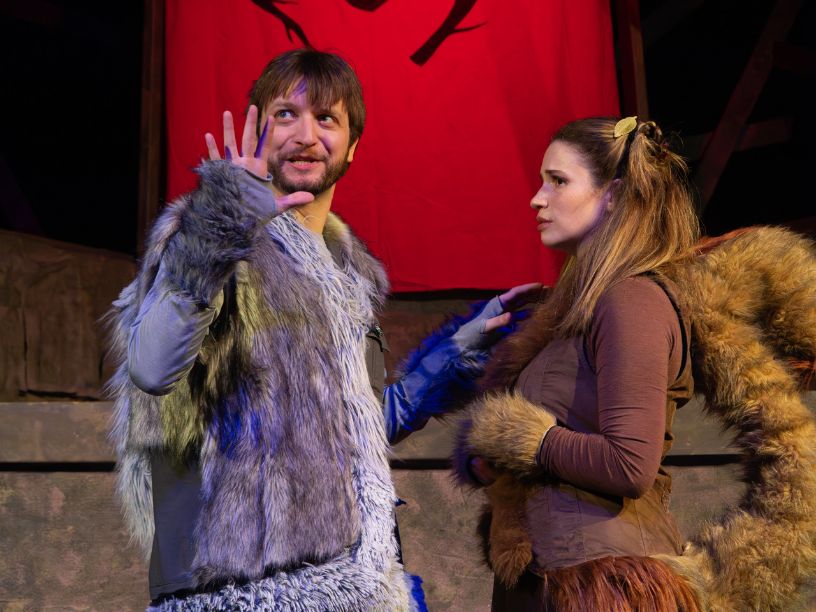
Finally, but only to save the best for last, the cast is nothing short of phenomenal. Each actor brings the human out of the animal to create a relatable whole. Luthra lets us through the keyhole of Sciurus’s confusion and pain while stubbornly clutching his moral inflexibility. His Shakespearean chops poke through as whispers of King Lear. Clough’s Mammalia reveals a fierce loyalty and maternal instinct and an even fiercer loneliness. Clough is superb at squirrel speak and her fluid movements are a wonder to behold. Jennings creates in Chordata a passionate, compassionate heroine who is never still for a second. Koevary is perfect as Rodentia, the self-absorbed, wanton sex squirrel wannabe and Bertin brings a Snidely Whiplash sliminess to Sciuridae.
The only flaws on opening night were the fight scenes, which felt overlong and clumsy. In a two-hour (one intermission) production, shaving minutes would be a plus.
Lest any reader think this glowing recommendation is due to an affection I have for these eponymous creatures, let me set the record straight. Squirrels, for me, rank slightly below COVID and barely above the bubonic plague. My delight in this production is despite its subject, not because of it.
Director Brooks Reeves sums up the play’s appeal in his press release comments. “I fell in love with this play from the moment I read it. It’s funny, dramatic, and has an operatic scope that mirrors my own love of drama and the absurd. I was already galvanized to take this script on, but over the past few months, this play has felt less like an opportunity to put on a fun, amusing show; it now feels like a primal cry to speak truth to power.”
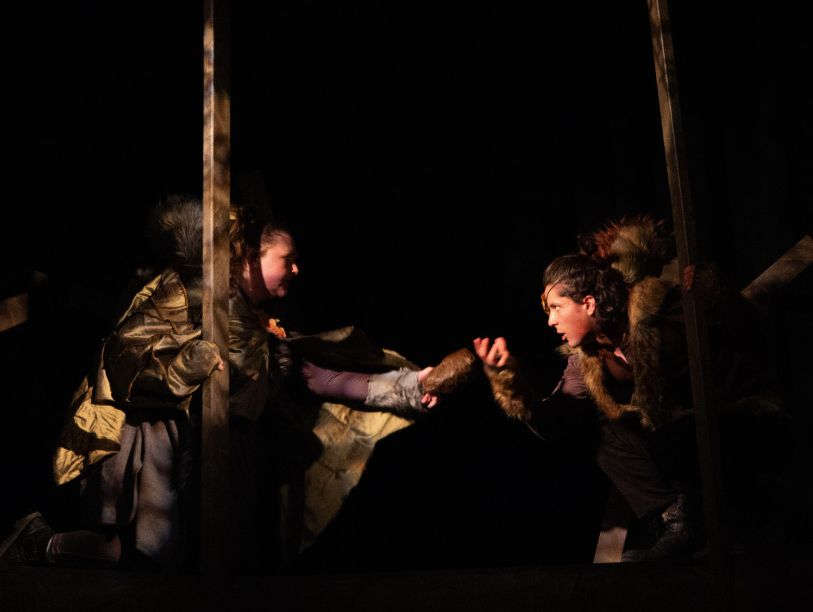
The Squirrels ends with the Scientist informing us that its plot is based on the true story of its author finding 40 dead squirrels in his backyard in 1992. “Can the mistakes of a handful of squirrels threaten everything?” he asks, after describing how squirrels are the reason there are forests on Earth. “If so, some squirrel would have to do more than make noise.”
As is Apollinaire Theater Co. tradition, he invites the audience to write on the blank chalkboard in the lobby. The prompt? “How are you resisting in your life?”
Highly recommended.
For more information, visit www.apollinairetheatre.com

